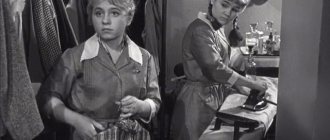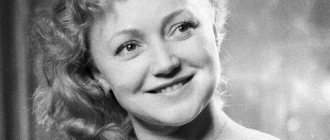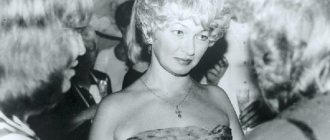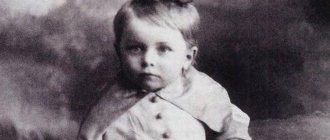Biography
Lyudmila Evgenievna Ulitskaya was born on February 21, 1941 in the city of Davlekanovo, Republic of Bashkortostan, where her family was evacuated. In 1944, the Ulitskys returned to Moscow, where the future writer graduated from school. Lyudmila received a biological education - she graduated from the Faculty of Biology of Moscow State University. M. V. Lomonosov, specialty: geneticist, biochemist. After that, she worked for two years at the Institute of General Genetics of the USSR Academy of Sciences, from where she left in 1970. Ulitskaya never returned to science.
In 1979, Lyudmila Evgenievna was offered the position of head of the literary department of the Jewish Chamber Musical Theater, where she worked until 1982. Then she began writing plays for children's and puppet theaters, dramatizations for radio, and scripts for cartoons. Ulitskaya's literary activity began in the late 1980s, when the writer published her first stories. However, two films brought her real fame: “The Liberty Sisters,” which director Vladimir Grammatikov shot from her script in 1990, and “A Woman for Everyone,” which was released a year later.
Lyudmila Ulitskaya. Photo: www.globallookpress.com/ Nikolay Titov
Early years
Her parents were evacuated from Moscow to Bashkiria during the fighting, and Lyudmila Evgenievna was born there. After the war, the Ulitsky family returned to the capital. After graduating from school, Lyudmila became a student at Moscow State University. She entered the Faculty of Biology, choosing genetics as her specialty.
Her father and mother were also involved in science, so the girl did not face a difficult choice; she decided to follow the example of her parents. Her mother, M.B. Ginzburg was a biochemist by profession and worked at a research institute; father, E.Ya. Ulitsky, had a doctorate in science and devoted a lot of work to the study of agriculture and mechanics.
After receiving her diploma, Lyudmila Ulitskaya got a job in her profession at the Institute of General Genetics named after I.I. Vavilova, who belonged to the USSR Academy of Sciences, however, did not work there for long. Two years later, in 1970, she was forced to write a letter of resignation, as she was caught illegally reprinting anti-Soviet journalism. She never returned to science.
Literary activity and awards
In 1992, Ulitskaya’s story “Sonechka” was published in the New World magazine, which cemented the writer’s name in the memory of Russians. Four years later, this story was recognized as the best translated book in France, for which Ulitskaya was awarded the French Medici Prize. In the UK, the book was shortlisted for the Booker Prize.
In 1996, the writer released the novel Medea and Her Children, which was also shortlisted for the Booker Prize. A year later, “Merry Funeral” was released, which was filmed in 2007 by Vladimir Fokin . In 2001, the novel “The Kukotsky Case” was published, and Ulitskaya became the first woman to receive the Russian Booker Prize.
In 2006, another novel by Ulitskaya was published, “Daniel Stein, Translator,” based on the true story of a Catholic priest of Jewish origin, Oswald Rufeisen. Soon the novel was recognized as a bestseller, and in 2007 it won the Big Book Award. In 2011, the writer published the book “The Green Tent,” which tells about the life of dissidents and the generation of the “sixties.”
In 2012, Ulitskaya presented the collection “Sacred Trash,” which included not only autobiographical prose, but also essays by the writer. In 2013, she became the author and compiler of the book “Childhood 45-53. And tomorrow there will be happiness" - a collection of stories about people whose childhood passed in the post-war years. In 2020, her parable novel “Jacob’s Ladder” was published, which received the largest number of audience votes and received the 2020 Big Book Award. In the same year, the collection “The Gift Not Made by Hands” was published - Ulitskaya’s last published book to date.
Lyudmila Ulitskaya was also awarded several international literary awards and awards from France. The writer is a Chevalier of the Order of the Academic Palms (2003), a Chevalier of the Order of Arts (2004) and an Officer of the Legion of Honor (2014).
Creators and the “backward”. In the next 150 years, will Russians not become Europeans? More details
Biography of Lyudmila Ulitskaya
In 1979-1982, Ulitskaya worked as the head of the literary department of the Chamber Jewish Musical Theater.
Ulitskaya began publishing her stories in magazines in the late eighties, and fame came to her after the films “Liberty Sisters” (1990, directed by Vladimir Grammatikov) and “A Woman for Everyone” (1991, directed by Anatoly Mateshko) were made based on her script. ), and the story “Sonechka” (1992) was published in the magazine “New World”. In 1994, this work was recognized in France as the best translated book of the year and brought the author the prestigious French Medici Prize, and in 1998, “Sonechka” became the laureate of the Italian literary award Giuseppe Acerbi.
Lyudmila Ulitskaya’s first book (collection “Poor Relatives”, 1993) in French was also published in France.
The best stories of the competition by Lyudmila Ulitskaya on the Weekend project page RIA Novosti group of sites >>
In 1996, Ulitskaya’s book “Medea and Her Children” was published, which made her one of the finalists for the 1997 Booker Prize and made her truly famous. Then there was the story “Merry Funeral”, and in 2001 the novel “The Case of Kukotsky” was published, which became a winner of the Russian Booker Prize.
In 2005, the book was filmed by director Yuri Grymov.
In 2006, the book “The Kukotsky Case” was awarded the Italian Penne Prize.
April 30, 2003 at the Theater. K.S. Stanislavsky hosted a presentation of Lyudmila Ulitskaya’s third novel “Sincerely yours Shurik”. After the release of this book, the writer stated that “Shurik” is her last novel, explaining that the creation of large prose forms is “too energy-intensive a process, truly a marathon distance.”
In 2005, Ulitskaya published the book “People of Our Tsar” - a collection of stories in which the heroine comes into contact with different people at different times and in different countries, observing the subtlest movements of the human soul from its dark depths to the highest spiritual manifestations.
Ulitskaya’s new work became the winner of the online voting for the Big Book Award.
In 2006, failing to keep her promise to move away from the novel form, Ulitskaya published the book “Daniel Stein, Translator,” which soon received bestseller status. The novel, based on the life of Catholic priest Oswald Rufeisen, was also published in 2007 by Fr.
In 2007, the premiere of the play “Russian Jam,” based on the play by Lyudmila Ulitskaya, took place in St. Petersburg at the Satire Theater on Vasilievsky. The production, directed by Andrzej Bubien, won the Golden Sofit Award (2008) and was nominated for the Golden Mask Award (2009).
In 2007, the writer organized the Lyudmila Ulitskaya Foundation to support humanitarian initiatives. The foundation is implementing the children's book project “Other, Others, About Others” and works under the “Good Books” program of charitable assistance to libraries.
In 2009, Russian writer Lyudmila Ulitskaya was included in the list of contenders for the 2009 International Booker Prize, whose applicants also included such famous writers as the American Edgar Doctorow, the Peruvian Mario Vargas Llosa, and the English-language writer of Indian origin and Nobel Prize laureate Vidyadhar Naipaul.
Awards
- Literary prize Prix Medici (1998, France)
- Literary Prize Prize named after. Giuseppe Aserbi (1998, Italy)
- Booker Prize (2001)
- Knight of the Order of the Academic Palms (France, 2003)
- Book of the Year Award for the novel “Sincerely yours, Shurik” (2004)
- Chevalier of the Order of Arts and Letters (France, 2004)
- Penne Prize (2006, Italy) - for the novel “The Kukotsky Incident”
- Big Book Award (2007) - for the novel “Daniel Stein, Translator”
- Grinzane Cavour Literary Prize (2008, Italy) - for the novel “Sincerely yours, Shurik”
- Nomination for the International Booker Prize (2009, England)
- Literary award of the Znamya magazine in the Globe category (2010)[1] for “Dialogues” between Mikhail Khodorkovsky and Lyudmila Ulitskaya, published in the tenth (October) issue of Znamya for 2009[2].
After university
The future writer’s first place of work was the Institute of Genetics at the USSR Academy of Sciences. She left there in 1970. Since then, as Lyudmila Ulitskaya herself admits, her biography has never again been connected with public service. Although she changed many specialties.
She was the head of the literary department of the Chamber Jewish Musical Theater, composed plays for children, productions for radio and puppet theater, wrote essays and reviews of performances. At that time, she even translated poetry from Mongolian.
She began publishing her own stories in magazines in the early 80s. Popularity came to her after about 10 years. After she began writing scripts for films.
Author's bibliography
Ulitskaya has written several dozen books during her creative career. These are not only novels, but also short stories.
Its first publications were collections of stories “Childhood-49”, “Second Face”, “First and Last”, “Stories about Animals and People”, “The Art of Living”.
At the same time, her stories “Through Line”, the already mentioned “Sonechka”, the family chronicle “Medea and Her Children”, the story “Merry Funeral”, and another collection of stories “Poor Relatives” began to appear.
Her first novel was “The Case of Kukotsky.” Then the collections of stories “Girls”, “People of Our Tsar”, “Sacred Garbage”, the novels “Sincerely yours Shurik”, “Daniel Stein, Translator”, “Green Tent”, a collection of plays “Russian Jam and Other” appeared.
Her last works to see the light were the collection of stories “Childhood 45-53. And tomorrow there will be happiness,” the parable novel “Jacob’s Ladder” and the collection “The Gift Not Made by Hands,” published in 2016.
Lyudmila Evgenievna Ulitskaya is a Russian writer. She was born on February 23, 1943 in Bashkiria (Davlekanovo), where her family was evacuated. Grandfather was repressed. After the war, the Ulitskys returned to Moscow, where Lyudmila graduated from school and then from the biology department of Moscow State University. She worked for two years at the Institute of General Genetics of the USSR Academy of Sciences. Then she worked as director of the Chamber Jewish Musical Theater, where she wrote dramatizations for radio, children's and puppet theaters, essays, children's plays, translated poetry from Mongolian, and reviewed plays. She began publishing her stories in magazines in the late eighties. In 1990, based on her script, director Vladimir Grammatikov made the film “Liberty Sisters”, and in 1991 Anatoly Mateshko’s film “A Woman for All” was released. After this, fame came to Ulitskaya.
The works of Lyudmila Ulitskaya have been translated into 33 languages. She was awarded literary prizes in several countries: Russia, France, England, Italy.
Six films were shot based on the script by Lyudmila Ulitskaya: “Liberty Sisters” (1990, director Vladimir Grammatikov), “A Woman for Everyone” (1991, director Anatoly Mateshko), “Dying is Easy” (1999, director Alexander Khvan), “The Kukotsky Case” ( 2005, director Yuri Grymov), Through Line (2005, director Pyotr Stein), “From Nowhere with Love, or Merry Funeral” (2007, director Vladimir Fokin).
AWARDS:
• Simone de Beauvoir Prize (2011, France) • Literary Prize of the Znamya magazine in the Globe nomination (2010) - for “Dialogues” by Mikhail Khodorkovsky with Lyudmila Ulitskaya • Nomination for the International Booker Prize (2009, England) • Grinzane Literary Prize Cavour (2008, Italy) - for the novel “Sincerely yours, Shurik” • Big Book Award (2007) - for the novel “Daniel Stein, Translator” • Laureate of the national award for public recognition of women’s achievements “Olympia” of the Russian Academy of Business and Entrepreneurship (2007) • Penne Prize (2006, Italy) - for the novel “The Case of Kukotsky” • Book of the Year Award for the novel “Sincerely yours, Shurik” (2004) • Knight of the Order of Arts and Letters (France, 2004) • Knight of the Order of Academic Palms (France, 2003) ) • Booker Prize (2001) - for the novel “The Kukotsky Incident” • Literary Prize Prize named after. Giuseppe Acerbi (1998, Italy) - for “Sonechka” • Literary prize Medici Prize for the best foreign work (1996, France) - for “Sonechka”
AUTHOR'S BOOKS:
• Novel “The Green Tent” (2011) • Collection of plays “Russian Jam and Others” (2008) • Novel “Daniel Stein, Translator” (2006) • Collection of stories “People of Our Tsar”, collection of stories (2005) • Fairy tale “History” about the cat Ignasy, the chimney sweep Fedya and the lonely Mouse" (2004) • The fairy tale "The story of old man Kulebyakin, the whiny mare Mila and the foal Ravkina" (2004) • The novel "Sincerely yours Shurik" (2003) • Collection of stories "Girls" (2002) • The novel “Kukotsky’s Case” (2001) • The story “Merry Funeral” (1997) • The family chronicle “Medea and Her Children” (1996) • The story “Sonechka” (1995) • The collection of stories “Poor Relatives” • The story “Through Line” » • Collection of stories “Second Face”
Childhood and family of Lyudmila Ulitskaya
On February 21, 1943, in the Urals, in the village of Davlekanovo near Ufa, a girl was born into the Ulitsky family of evacuated Muscovites, who was named Lyudmila. No one could have imagined that many years would pass and she would become a famous writer. After the end of the war, the Ulitsky family returned to Moscow. Here Lyudmila graduated from school and entered the Faculty of Biology at Moscow State University. Her years of study at the university left a deep imprint on her future activities.
Genetics taught Lyudmila to think, look and observe, and Ulitskaya’s university teacher, the outstanding geneticist Vladimir Pavlovich Efraimson, was an example of impeccable morality for the young student. After graduating from university in 1968, Lyudmila Ulitskaya began working at the Institute of General Genetics of the USSR Academy of Sciences. Two years later, in 1970, Lyudmila Evgenievna left her job. The reason for the dismissal was the reprinting of samizdat. As Ulitskaya herself recalls, in those years many were punished for reading and reprinting samizdat. Ulitskaya did not work for some time, and when she tried to return to scientific work, she realized that the profession had abandoned her.
Jews through the eyes of famous friends and foes
*****
I come from a Jewish family, the third generation has a higher education. Both great-grandfathers were watchmakers, one from Smolensk, the second from Kyiv. The father of my Smolensk great-grandfather, Isaac Ginzburg, was a cantonist, served for twenty-five years in the tsarist army, in Skobelev’s army, received a soldier’s George for the capture of Plevna, and rose to the rank of non-commissioned officer. Both grandfathers - Yakov Ulitsky and Boris Ginzburg - spent time in Stalin's camps, both came out alive, but Yakov served three times, for a long time, and died shortly after liberation in exile. I saw him once in my life, as a girl. The family was wonderful - worthy, decent people. Almost all. My great-grandfather was a religious Jew, the last in the family, after him came the atheistic generation. I remember him in the tallit, with tefillin, with the Torah. He died in 1951, the wonderful death of a righteous man, surrounded by his family, and I was there, and since then I have not been afraid of death. My mother was lovely, so good, kind and simple-minded, she trained as a biochemist; my father was not so good, but he was also quite simple-minded and also a scientist, a doctor of science, who spent his entire life designing tractors.
Did I feel my Jewish heritage as a child? I didn't feel it, I knew. In 1953, when there was the “Doctors’ Plot” and anti-Semitism was everywhere, I fought fiercely with a street boy, my peer. It was very disgusting to live then, but in our courtyard company they treated me well. Mom was then laid off from her job; she worked at the Institute of Pediatrics, but then she was reinstated. I knew that being a Jew was bad, but I coped with this trouble quite well. Do I find in myself specific traits inherent in the “Jewish character”? If you explain to me what specific Jewish traits are, I will try to answer this question. I myself could not answer this question, and I have never asked the question like that. Don’t you think this way of posing the question is anti-Semitic?.. In Russia, too, every city has its own dialect; a resident of the North can be easily distinguished from a Siberian or Volzhanian, and a Muscovite from a St. Petersburg resident. An intelligent Muscovite speaks “akaya” in Moscow, regardless of whether he is Russian or Jewish. As for the ethnic groups living over vast territories, the Jews living in Spain did not understand the Jews living in Germany or Poland: some were Sephardim, others Ashkenazim, and the only common language was the liturgical language, Hebrew, which was not spoken in everyday life . To this day in Israel, where both live, this difference remains. Is it possible to talk about specificity in this case? There are also colossal social differences associated with the characteristics of education and environment. My environment is Moscow cultured, often highly educated Jews, but also Russians, also from a cultured environment. So the difference between my Russian and Jewish friends is much less than between poorly educated and cultured people, no matter what nationality they belong to. It is for this reason that it is difficult for me to talk about the specific characteristics of Jews.
In Max Frisch's play "Andorra" there is a character who in one translation of the play is called a "Jew-watcher", and in another "Jewisher" - a specialist in identifying Jews. The play is a political pamphlet, but the plot is also very interesting from a psychological point of view. A young man from a small town, due to the secret circumstances of his birth, is declared a Jew, but in fact he is not. But for those around him, he is a typical Jew, and they attribute to him all the mythical characteristics of Jews. Therefore, I have a suspicion that your statement “about the Jewish combination of intellectualism with enterprise, rationalism with extreme abstraction... and about the economic and financial talents of Jews” is in the same series, and it causes me an internal protest. Although, as a geneticist, I am aware that there are genes that are more common in Jewish populations than, say, in Swedish ones. But, as a rule, this is associated with certain genetic diseases, and not with qualities for which not one gene is responsible, but many genes, also distributed on different chromosomes. In general, it is precisely the very subtle studies of recent years that provide a completely new picture, different from previous ideas about “national packages” of genes. Of course, Jews are people of the Book: two and a half millennia, during which Jewish boys from the age of five began to learn to read and write, and this training ultimately came down to “polishing the brain,” and not just to memorizing texts from the Torah, plus a commentary system as a way of studying the subject, and all this gave a brilliant result. But this result was noticed only from the time when the Jews of the Austro-Hungarian Empire, after the decree on tolerance at the end of the 18th century, became full citizens and began to receive secular education (by the way, the Jews initially rebelled terribly against these “tolerant” decrees!), but three or four generations later, their children and grandchildren began to receive Nobel Prizes. For some reason... That is, modern science is based on brains “polished” by scholastic techniques! But the shtetl Jews, deprived of secular education, were quite different from the educated ones, and no nobles were observed there. And there is only one genetics! Where will we look for specific features? The seam is quite noticeable!..
As a child, I was once called very insultingly “Sarochka” on the street. I remembered. I lived in a communal apartment, and relations with my neighbors, very simple people, were good. Mom was loved, and I think it was her merit; she behaved impeccably: kindly and with self-esteem. State anti-Semitism undoubtedly existed during my childhood and youth to a much greater extent than it does today. However, my personal history is such that I always take all my failures upon myself and believe that my own shortcomings hindered me in life much more than government or any other anti-Semitism. I didn't get into university the first time, and I definitely failed in the German language exam. But this was more due to my self-confidence than to the teacher’s intention to “cut me off”... After graduating from university, I entered the position of research intern at the Institute of General Genetics of the USSR Academy of Sciences, and it was a great assignment. They kicked me out of there not because of the anti-Semitism of the authorities, but because they “covered me up” for “samizdat”. Again, there was no reason to complain about particularly bad treatment of me as a Jew. Together with me, they expelled another Jew and two or three Russian guys. It was always instilled in me in my family that, since anti-Semitism is very widespread in our country, as a Jew, in order to get an “A”, I need to know a subject with a “Six”. In a sense, anti-Semitism forced me to work very intensively and responsibly. And difficulties were beneficial to the cause. (From an interview on the website lechim.ru 08/6/2014 – A.Z.)
*****
I turn my head, I’m surprised, I’m horrified, I’m happy, I’m indignant, I admire. Constantly stings in the nose - this is the signature Jewish feeling of life - sweet and sour. It’s terribly difficult to live here: this broth is too thick. The air is thick, passions are high, there is too much pathos and shouting. But it’s also impossible to tear yourself away: a small provincial state, a Jewish village, a self-made state still remains a model of the world. On the chosen people, the Lord is still training his abilities, playing... I completely gave up assessments: I can’t cope. Personally, I will never be able to cope even with my personal Jewishness: I am tired of it worse than a bitter radish. It is intrusive and authoritarian, a damn hump and a wonderful gift, it dictates logic and way of thinking, fetters and swaddles. It is irrevocable, like gender. I want to be free so much—Jewishness does not give me freedom. I want to go beyond its limits, and I go out and go anywhere, along other roads, I walk for ten, twenty, thirty years, and at some point I discover that I have not gone anywhere. I sit at the Passover table, surrounded by my family, and it makes absolutely no difference whether they chew Easter cake or matzah, break a flatbread or eat prasad grains - I hear the same thing: blessed are the children sitting at this table... This, of course, is what speaks within me Jewish pathos, which cannot be escaped. Apparently it's genetic.
*****
You know, this (why they don’t like Jews - A.Z.) is a huge mythology about the Jew in general as such... This is actually a philosophical topic. This is a different, alien, not entirely understandable topic. The fact is that the Jew was much less understood in the 19th century, when there was a ghetto, and when Jews maintained their national identity by preserving their language very heroically for many centuries. I am just that Jew who has completely lost his identity; my only favorite and precious language is Russian. I think that there is a very powerful mythology here, the mythology of misunderstanding another person... Therefore, I think that this is a kind of xenophobia, which probably has an absolutely biological basis... In fact, I honestly admit, this is not a very interesting topic for me. It was once interesting to me, when I was a girl, when my parents, during the years when there was a “doctors’ case,” my mother was fired from work, my father did not work then, I lived with this topic in my youth. Now it is internally resolved for me, it is not very important. And today it seems to me that the Jewish question is actually not a question of Jews, but of Russians, people who are experiencing tension about this. Because, to be honest, I don’t have any tension, she left me quite a long time ago. And in my life, in practical, everyday life, this is a completely almost absent dimension.
*****
About two years ago I was invited to an institute where they deal with Jewish problems in Europe, it is in Stockholm. And there, for the first time in my life, I came into contact with how Jews study. You know, this was a very big discovery for me. It turned out that for almost three thousand years, Jewish boys at the age of four or five were taught to read and write, and they were taught to read and write from the book that we call the Bible. And when children are taught and taught for ten years, starting from the age of five, and they are taught to think, each phrase is discussed from all sides 15 times, and if so, and if so, it amazed me. And partly I understood this very riddle: why are there so many learned Jews there, why are there so many Jews on the heights? The fact is that there are three thousand years of education, and this is very serious, apparently.
*****
What happened during the Second World War, which is called the Holocaust, is in fact evidence of the deepest crisis of Christian civilization. Two thousand years of Christianity - after all, it’s two thousand years, it turned out that this civilized Christian society was completely at the level of development of the horde, the monstrous horde. The crowd lives according to certain laws, regardless of where it is. The most terrible thing I know about the Holocaust, the most terrible thing is not even the number 6 million, 18 million, 20 million, no, the most terrible number is 200 Jews who were killed in Poland by the Poles in 1946. When it was all over, when there were almost no Jews left, there was a pogrom against Jews in a small Polish town, and 200 people were killed there. This figure completely amazed me, because there are no lessons. All of Europe was covered with bones and ashes, we still breathe this air, however, it seemed to some that it was not enough, another 200 people were sent after them in 1946, when the war was already over.
******
In our country, even the word “Jew” sounds indecent. The head of the personnel department at the institute where I worked in ancient times, a nice woman, called Jews “Jewish” and “Jewish,” thus softening the indecentness of the word and emphasizing her good attitude. The funny thing is that she really was a decent person and did not persecute Jews on her own behalf, only out of official necessity. I didn’t choose my nationality or the place where I would be born...Yes, yes, Jewish. Dad, mom, all around and hopeless. But I am a Russian writer. Russian language is my homeland. When they call me a Jewish writer, I don’t dare object. Probably Pasternak, Mandelstam, Babel and Brodsky had to hear the same thing. In fact, this is a large and interesting topic: Jewish writers in different cultures. Perhaps there is some insoluble national component. Let the experts investigate.
*****
This is the most vile question in the history of our civilization. It must be canceled as fictitious, as non-existent. Why do all humanitarian, cultural and philosophical problems - not to mention purely religious ones - constantly dance around the Jews? God mocked his Chosen People much more than all the others! (From the book “Daniel Stein, translator” - A.Z.)
*****
There (in Israel – A.Z.) an essentially asymmetrical situation has developed. Everyone always forgets about this. When you look at the Middle East map, you see that it is all red. This is the Arab world. And in the midst of this world there is a white nail. One thousandth by volume. This is Israel. And Israel's main task is survival. Preservation of itself as a state. But in the Arab world there is an opposite point of view - Israel should not exist. And this is asymmetrical - when some say: “We need to survive,” and others: “You shouldn’t exist.” From this comes the monstrous tension of life in Israel. These people constantly live under the threat of the destruction of their country... After the destruction of most of the Jewish population in Europe during the Second World War, I believe that this country has the right to a piece of land. Within what boundaries it will be located are things that are being discussed. On the other hand, I am full of sympathy for the Arabs. Especially to the Christian Arabs, whose situation is generally terrible. This is who is caught between a rock and a hard place. You see, there are many different sides to this problem. And there are issues that generally do not have an instant solution. They can only be solved by time or insane patience and a lot of effort... Now in different countries of Europe there is an increase in the popularity of right-wing, nationalist parties. Previously, it was believed that the roots of nationalism were in the social disorder of society. But today, among the fighters for the national purity of states, there are many prosperous, educated people... Today it is absolutely clear that in some conditions a call is given “from above” and irritation against discomfort and inconvenience is channeled in a certain way. In 1949, this was an anti-Semitic affair of cosmopolitans; recently the spearhead suddenly turned against the Georgians. These are phenomena of the same order. It all depends on how persistently the leaders of such processes will build this line. If the anti-Georgian line were consistent, then after a while everyone would forget about anti-Semitism. And the main enemy of humanity would be someone else. (From an interview for the magazine “City”. See Magazine.russ.ru - A.Z.)
*****
– How do you perceive your Jewishness? Would you like to move to the Promised Land permanently? What do you love and dislike about Israel?
– I’ll answer in Hebrew – with a question to the question: how do you perceive your blood type? As a child, being Jewish was very burdensome, over the years I came to terms with it, and eventually even began to appreciate it. The fact is that for half my life I insisted that people have qualities and properties that are more important than blood. And at the end of my life I looked back and discovered that for some reason most of my friends were Jews. Well, apart from my Russian husband... I love Israel very much. I’ve been coming here almost every year for more than twenty years; I’ve seen every corner, it seems. My feet know that the Land is Holy: I walked on it a lot. But it is a very uncomfortable country to live in. I’m not talking about everyday life - it’s worse than in Russia, you also have to look for it. I’m talking about something else – a monstrous and insoluble conflict at a very deep level. And over the years it becomes deeper and deeper. Sometimes I think that we Jews are not a people, but a model of a people. The Higher Powers are constantly experimenting on us. This is probably what it means to be chosen by the people. (From an interview in the online newspaper “We are here” 01/20/2016 - A.Z.)
*****
I lived under Stalin, Khrushchev, Brezhnev, Yeltsin, and now I live under Putin. I can’t help it - everyone makes me sick. It’s like the change of seasons: cold in winter, heat in summer, rain in autumn, and spring flashes by so quickly that you don’t even have time to notice. But the essence of life does not change, it is beautiful and exciting. It’s very interesting for me to watch, this swing is life... Who, in my opinion, should go and for whom it is contraindicated? It's a matter of personal choice. There are not and cannot be any general solutions here. I know quite a few Jews who immigrated to Israel and then left: some back to Russia, some to America, some to Australia. Emigration is a very difficult path. And although I have never emigrated, I see this in my friends and acquaintances. It was one thing for Jews to flee from Germany to America or Palestine in the 30s, another thing to flee to Germany from Russia in the 70s, and a third thing was the unexpected emigration from France to Israel in recent years. People have different motivations, and each person independently decides this issue for himself and his family... About children - a separate question. We are now at such a civilizational boundary that education, as it seems to me, consists of one thing - a good education. This is the best thing we can give to our children. And what they do with him - they will be responsible for that themselves. However, the answer to this purely Jewish question is that Jewish parents have always worked hard to give their children an education. For some - cheder, for others - university... We are all, one way or another, children of galut. Our ancestors lived everywhere - in Spain, France, Germany, Poland, Russia. They took root, entered into a foreign culture, sometimes turned out to be exceptionally fruitful in it, made their contribution, assimilated, and then ran away, leaving the graves of their ancestors. Of my five grandchildren, three live in England, two in Russia. I live in Russia, although I spend a lot of time in Europe. I feel at home in Moscow, at the Airport. I have never left Moscow for more than three months. I'm starting to miss the place, my friends, mainly. But gradually things are coming to the point that I feel at home where my computer is... How do you know what my attitude towards Zionism and Israel is? I have never spoken out about this. Several years ago, a landing of Russian writers landed in Israel, and it had unexpected consequences for me. Dmitry Bykov, a man of incredible abilities, perhaps a genius, said that, in his opinion, “Israel is a failed project.” This is an interesting statement. It would be worth asking him what exactly he means. Another semi-writer lady, I don’t remember her last name, also said something along these lines. Your esteemed journalists brought me there, although I was nowhere near there, and since then I have constantly heard about my “complicated” attitude towards Israel. My book “Daniel Stein, Translator” was also regarded by a number of critics as anti-Israeli, some even wrote “pro-Arab”. Idiocy is an incurable disease. I am not going to enter into discussions on this matter. Since 1993, I have visited Israel every year, for 23 years now. Sometimes - several times a year. I know Israel in a way that few Israelis know it; I have explored all its nooks and crannies. No, not all - because every time I come, I make new discoveries. Zionism, since the creation of the State of Israel, belongs to history. The objectives of Zionism were completed. We read the names of the creators of this movement in the names of the streets. It is inappropriate to talk about my worldview here, because the country itself does not have a coherent worldview. And how can a country that is constantly at war and defending its undoubted right to exist have an integral worldview? This is where processes in opposite directions are taking place today, this is where you can observe complete discord in opinions! Among my friends there are both left and right, there are “faithful” Jews, and “infidel” Judeo-Christians, and loyal atheists. They argue and quarrel fiercely among themselves, but both of them selflessly love their country. And I love Israel. Just as he is: talented, flashy, scandalous, merciful, stiff-necked, small and huge. I see many advantages in it. And I see the shortcomings. And yet – a mystical thing! – I’m partly buried there. My breast, amputated during cancer surgery, lies in the burial ground at the Givat Shaul cemetery in Jerusalem, along with body parts of Israeli citizens who were treated at the same Hadassah hospital. Only they were treated for free, at the expense of the state, and I was treated commercially as a foreigner. And this experience of being in a public hospital was precious. Israeli medicine and the relationships between people are amazing. By the way, this was the place where one of the most difficult problems was dissolved - Arab-Israeli relations: here there were patients and doctors, Arabs and Jews, and they did a common job...
There's a problem with the book. The book comes to an end. Her life - from Gutenberg to the Internet - is ending. We are making incredible efforts to instill in our children and grandchildren a taste for books. My latest trick: I give my teenage grandson rare and expensive antique books, and he understands that the book is a treasure. But what else can I give to these children if I myself, when I need to check something, go not to Perferkovich’s Jewish Encyclopedia, and not to the New Israeli Encyclopedia, also in Russian, although both are on the shelf, but I open the Internet. What you call “virtual” life does not seem to me something fundamentally different, deeply different from book existence. So far, Svetlana Alexievich received the Nobel Prize for the book, although this information could well have existed on another medium. Jews are people of the Book. Big and small, talented and completely mediocre. Jews entered a written culture in many languages of the world - not only Yiddish or Hebrew. We know English, French, German, Polish and other foreign-language Jewish writers who did not even speak Hebrew. And all these writers with Jewish roots will write as they wrote. And what difference does it make in the end - on clay tablets, on papyrus, on Chinese paper or on an American computer? The main thing is that people write words, create text. (From an interview on the website Jewish.ru 08/12/2016 - A.Z.) Comment: In February 2007, the 23rd International Book Fair was held in Jerusalem. As part of this event, an international festival of Russian books was organized, to which famous writers from Russia were invited. Among them were, as the Israeli press noted, “a lot of ethnic Jews.” The festival, which by all accounts should have been a success, however, turned into a big scandal. The whole point is that Russian writers, instead of admiring “our young country,” allowed themselves to speak openly about “Israel.” Thus, Lyudmila Ulitskaya, considered by some critics to be almost the best Russian prose writer of our time, as written on one of the Russian-language websites, “with her characteristic directness, declared to the enthusiastically listening public that “although she is a Jew, she is an Orthodox Christian by faith,” that “It’s morally difficult for her in Israel,” and this is due to the fact that /according to her conviction/ “in the homeland of Jesus Christ, life is very difficult for representatives of Christian denominations, and it is especially difficult for Arab Christians, since “on the one hand, they are oppressed by Jews , and on the other – Muslim Arabs.” The audience left quite surprised and discouraged by the aggressive passages of their favorite writer.
******************************************************
A remark regarding some of Lyudmila Ulitskaya’s statements in her recently published interview in the Panorama newspaper
This is probably true: people do not act in accordance with their views, but on the contrary, they bring their views into line with their actions. So one day the writer Lyudmila Ulitskaya did something: she converted to Orthodoxy. And for the rest of his life he comes up with all sorts of arguments that theoretically justify this act.
In Russia we have had to endure unprecedented and unprecedented anti-Semitism. Of course, there were times and countries when Jews were exterminated by the millions; in Russia it didn’t come to this - it didn’t come a little, as it now turns out. But such thick, sticky hatred, when every mention of anything Jewish caused angry hooting, when the very word “Jew” was considered an insult (it was, if necessary, replaced by the euphemism “person of Jewish nationality”), it is not easy to survive, needless to say. Is it any wonder that some people have a desire to run away, oh). It was especially difficult for writers: after all, they write in Russian, but how can a Jew be called a Russian writer?! That’s when this phenomenon appeared - the transition of the Jewish intelligentsia to Orthodoxy. That is, crosses have always existed, but as a mass phenomenon, as a fashion, it was a product of the late Soviet era.
But this doesn’t make it any better for those who are crossed, that’s what’s important to note. Anti-Semites still hate them as Jews, and Jews still see them as renegades. Lyudmila Ulitskaya has found a way out here too: she declares both of them idiots. Anyone who disagrees with her is an idiot. That's all. And period. Simple and convenient. She explains that she converted to Christianity “in search of the inner right to freedom of thought.” Where is she going to find it? In the Russian Orthodox Church? Well, well, let him try...
“A person is free to believe in whatever he wants,” says L. Ulitskaya. And here it’s hard to disagree with her. But the fact is that converting to another religion is not only a matter of religion, but also of morality, although converts do not want to admit this. After all, during the years of the German occupation in France, Ariadna Scriabina changed her religion: she converted to Judaism. And she died saving Jewish children. Isn’t this a noble and highly moral act! And when our Jews convert to Orthodoxy, they run away from the persecuted minority into the camp of the persecutors, and it doesn’t matter what spiritual quest they have: their act is, first of all, an immoral act of cowardice! That’s why we call them “meshumeds,” that is, renegades.
In everything they try to emphasize their difference from us. What, for example, does the same L. Ulitskaya talk about when she arrived in Israel? About the problem of the survival of the Jewish state, which they are trying to destroy every day? About a new Holocaust? No, she is concerned about the financial problems of some Arab Christian church, which is allegedly offended by the Israeli authorities. You see, she is not like that at all, and they are all Jewish and Jewish... When discussing the moral side of apostasy, we tend to confuse it with another problem: can a meshumed be considered a Jew and can he become a citizen of Israel according to the Law of Return? I do not touch upon this problem here: I do not consider myself competent to discuss it; let experts in Halacha and Israeli laws speak out. I’m speaking here as an ordinary Jew: what feelings does the act of a renegade evoke in me?
Messaging cannot but affect creativity. Some, like Heinrich Heine, write about their actions, and write with bitterness. Others (L. Ulitskaya belongs to this category) in their works directly or indirectly try their best to justify their immoral act, inventing some incredible situations and motivations for this. Such “ideological rape,” alas, is noticeable in some of L. Ulitskaya’s novels. It seems that the writer cannot escape this painful topic for her and write something free from ideological blinders, such as, for example, her early story “Sonechka,” a true literary masterpiece. Apparently, apostasy burns... Vladimir MATLIN











